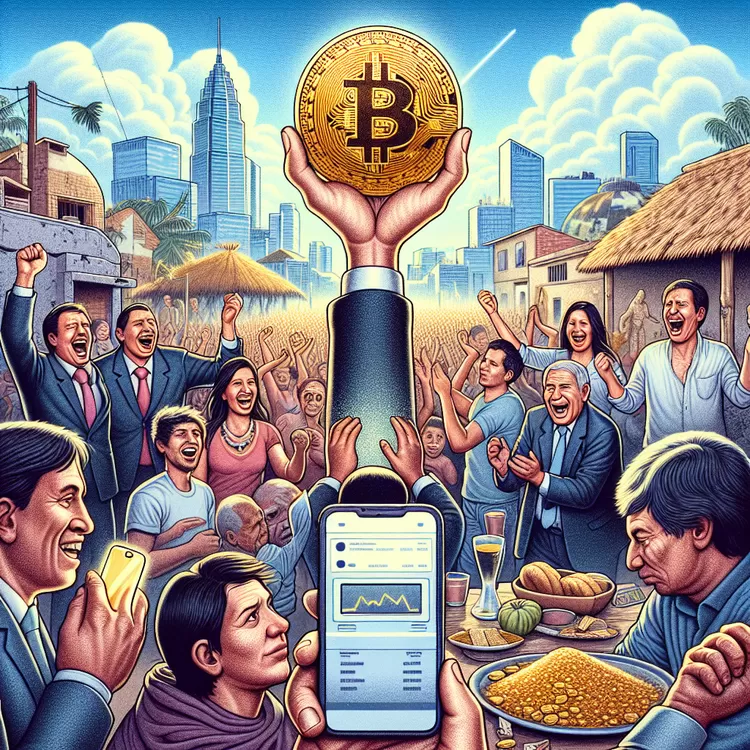El Salvador’s president, Nayib Bukele, is really happy about his investment in Bitcoin. He used more than $120 million of the country’s money to buy Bitcoin, and now the value of his investment is worth more than what he paid for it. Bukele wants his critics to take back what they said and say sorry for doubting him. But some experts say it’s too early to celebrate this risky bet on Bitcoin.
Bukele recently stepped down as president to campaign for a second term, which some people don’t like. He’s expected to win because he’s popular in the country. According to a website that keeps track of his Bitcoin, the coins he bought are now worth more than what he paid. If he sold them now, he could make about $3.7 million. But we can’t be sure about these numbers because the people who made the website didn’t comment on it.
Some people are cheering for Bukele and his Bitcoin success, but some experts say it’s not as important as he thinks. The $120 million spent on buying Bitcoin is just a part of the money used to promote Bitcoin in El Salvador since it became legal money. Critics say the government also spent money on making an app called Chivo Wallet, putting up ATMs that don’t work, giving $30 to people over 18, and organizing events and propaganda. When you look at all these expenses, it’s actually a negative result.
Another thing is that not many people in El Salvador are using Bitcoin, even though the government spent a lot of money on it. A BBC documentary found that most people aren’t using the digital money. Experts say the money spent on Bitcoin could have been used to help poor people and make sure everyone has enough food to eat.
People are also worried about how the government is spending money on Bitcoin and what Bukele’s reserves are. There’s no public group keeping track of this information, and critics say Bukele’s tweets aren’t enough. Even some Bitcoin fans think there should be more transparency.
In the end, President Bukele is happy about his Bitcoin investment, but experts say it’s too early to know what will happen in the long run. Bitcoin hasn’t been as successful in El Salvador as people thought, and there are concerns about how the government is spending money and not being transparent.
Original news source: Bitcoin rally: Is El Salvador’s Bitcoin bet paying off? (BBC)
Listen:
Slow
Normal
Fast
Vocabulary:
| 1 | investment | Putting money into something to make a profit |
| 2 | critics | People who say negative things about someone or something |
| 3 | campaign | Trying to get elected for a second time |
| 4 | popular | Liked by many people |
| 5 | track | Keep a record of something |
| 6 | sold | Gave something in exchange for money |
| 7 | numbers | Information or figures |
| 8 | important | Having great value or significance |
| 9 | negative | Having a bad or unfavorable result |
| 10 | expenses | Money spent on something |
| 11 | documentary | A film or television program that provides facts about a real situation or subject |
| 12 | transparency | The quality of being open and honest |
| 13 | successful | Achieving the desired result or outcome |
| 14 | concerns | Worries or doubts about something |
| 15 | transparent | Clear and easy to understand |
Group or Classroom Activities
Warm-up Activities:
– News Summary
Instructions:
1. Divide the class into pairs or small groups.
2. Provide each group with a copy of the article.
3. Instruct the groups to read the article and summarize the main points in a paragraph or two.
4. After a designated amount of time, have each group share their summaries with the class.
5. Facilitate a discussion to compare and contrast the different summaries.
– Opinion Poll
Instructions:
1. Divide the class into pairs or small groups.
2. Assign each group a specific topic related to the article, such as “Government Spending on Bitcoin” or “Bitcoin Adoption in El Salvador.”
3. Instruct the groups to come up with a poll question related to their assigned topic.
4. Give the groups time to create their poll question and possible answer choices.
5. Have each group present their poll question to the class and conduct a mini-poll by having students vote on their preferred answer choice.
6. After each group presents, facilitate a discussion about the different poll results and encourage students to share their opinions.
– Vocabulary Pictionary
Instructions:
1. Write a list of key vocabulary words from the article on the board or on a handout.
2. Divide the class into pairs or small groups.
3. Instruct each group to choose a word from the list and draw a visual representation of it.
4. Give the groups a designated amount of time to draw their pictures.
5. After the time is up, have each group take turns showing their picture to the class while the other students try to guess the word.
6. Repeat the process with different words from the list.
– Pros and Cons
Instructions:
1. Divide the class into pairs or small groups.
2. Instruct each group to make a list of the pros and cons of President Bukele’s investment in Bitcoin.
3. Give the groups a designated amount of time to create their lists.
4. After the time is up, have each group share their lists with the class.
5. Facilitate a discussion about the different pros and cons presented, encouraging students to share their own opinions and perspectives.
– Future Predictions
Instructions:
1. Divide the class into pairs or small groups.
2. Instruct each group to discuss and make predictions about the future of Bitcoin in El Salvador based on the information in the article.
3. Give the groups a designated amount of time to discuss and make their predictions.
4. After the time is up, have each group share their predictions with the class.
5. Facilitate a discussion about the different predictions, encouraging students to support their ideas with evidence from the article.
Comprehension Questions:
1. Why is El Salvador’s president, Nayib Bukele, happy about his investment in Bitcoin?
2. How much money did Bukele use to buy Bitcoin?
3. What is the current value of Bukele’s Bitcoin investment?
4. Why do some experts say it’s too early to celebrate Bukele’s Bitcoin investment?
5. Why did Bukele step down as president?
6. Why is Bukele expected to win a second term?
7. How much money could Bukele make if he sold his Bitcoin now?
8. Why are some people critical of Bukele’s Bitcoin investment?
Go to answers ⇩
Listen and Fill in the Gaps:
El Salvador’s president, Nayib Bukele, is really happy about his investment in Bitcoin. He used more than $120 million of the (1)______’s money to buy Bitcoin, and now the (2)______ of his investment is worth more than what he paid for it. Bukele wants his critics to take back what they said and say sorry for (3)______ him. But some experts say it’s too early to celebrate this (4)______ bet on Bitcoin.
Bukele recently stepped down as president to campaign for a second term, which some people don’t like. He’s expected to win because he’s popular in the country. According to a website that keeps track of his (5)______, the coins he bought are now worth more than what he paid. If he sold them now, he could make about $3.7 million. But we can’t be sure about these numbers because the (6)______ who made the website didn’t comment on it.
Some people are cheering for Bukele and his Bitcoin (7)______, but some experts say it’s not as (8)______ as he thinks. The $120 million spent on buying Bitcoin is just a part of the money used to promote Bitcoin in El Salvador since it became legal money. Critics say the government also spent money on making an app called Chivo Wallet, putting up ATMs that don’t work, giving $30 to people over 18, and (9)______ events and propaganda. When you look at all these expenses, it’s actually a negative (10)______.
Another thing is that not many people in El (11)______ are using Bitcoin, even though the (12)______ spent a lot of money on it. A BBC documentary found that most people aren’t using the digital money. Experts say the money spent on Bitcoin could have been used to help poor people and make sure everyone has enough food to eat.
People are also worried about how the government is (13)______ money on Bitcoin and what Bukele’s (14)______ are. There’s no public group (15)______ track of this information, and critics say Bukele’s tweets aren’t (16)______. Even some Bitcoin fans think there should be more transparency.
In the end, President Bukele is happy about his Bitcoin investment, but experts say it’s too early to know what will happen in the long run. Bitcoin hasn’t been as successful in El Salvador as people thought, and there are concerns about how the government is spending money and not being transparent.
Go to answers ⇩
Discussion Questions:
Students can ask a partner these questions, or discuss them as a group.
1. What is Bitcoin and why is it important?
2. How would you feel if you invested a lot of money in something and it turned out to be successful?
3. Do you think it’s a good idea for a government to invest in Bitcoin? Why or why not?
4. What do you think about President Bukele using the country’s money to buy Bitcoin?
5. How do you think the people who doubted President Bukele feel now that his Bitcoin investment is making money?
6. Do you like the idea of using Bitcoin as a legal currency? Why or why not?
7. What do you think about the government spending money on creating an app and putting up ATMs for Bitcoin?
8. How do you think the money spent on Bitcoin could have been used to help poor people?
9. What concerns do you have about the government spending money on Bitcoin without transparency?
10. How would you feel if you were a citizen of El Salvador and your government was investing in Bitcoin instead of helping people in need?
11. Do you think it’s important for the government to be transparent about how they spend money? Why or why not?
12. What do you think about the fact that not many people in El Salvador are using Bitcoin, despite the government’s efforts?
13. How do you think President Bukele’s Bitcoin investment will affect his chances of winning a second term?
14. What other ways do you think the government could have used the money instead of investing in Bitcoin?
15. Do you think Bitcoin will continue to be successful in El Salvador? Why or why not?
Individual Activities
Vocabulary Meanings:
Match each word to its meaning.
Words:
1. investment
2. critics
3. campaign
4. popular
5. track
6. sold
7. numbers
8. important
9. negative
10. expenses
11. documentary
12. transparency
13. successful
14. concerns
15. transparent
Meanings:
(A) The quality of being open and honest
(B) Putting money into something to make a profit
(C) Keep a record of something
(D) Achieving the desired result or outcome
(E) Gave something in exchange for money
(F) A film or television program that provides facts about a real situation or subject
(G) Trying to get elected for a second time
(H) Worries or doubts about something
(I) Money spent on something
(J) Having a bad or unfavorable result
(K) Information or figures
(L) People who say negative things about someone or something
(M) Having great value or significance
(N) Clear and easy to understand
(O) Liked by many people
Go to answers ⇩
Multiple Choice Questions:
1. How much money did Nayib Bukele use to buy Bitcoin?
(a) More than $120 million
(b) Less than $100 million
(c) Exactly $120 million
(d) More than $1 billion
2. Why does Nayib Bukele want his critics to apologize?
(a) Because he recently stepped down as president
(b) Because the value of his Bitcoin investment is now worth more than what he paid for it
(c) Because he is campaigning for a second term
(d) Because he is popular in the country
3. What is the current value of Nayib Bukele’s Bitcoin investment?
(a) More than what he paid for it
(b) Less than what he paid for it
(c) Exactly what he paid for it
(d) It is not mentioned in the article
4. What is the main argument of the experts who are skeptical about Bukele’s Bitcoin investment?
(a) Bitcoin is not as important as Bukele thinks
(b) It is too early to celebrate
(c) The money spent on Bitcoin could have been used for other purposes
(d) All of the above
5. What is one expense related to promoting Bitcoin in El Salvador?
(a) Putting up ATMs that work
(b) Giving $30 to people under 18
(c) Making an app called Chivo Wallet
(d) Organizing events and propaganda
6. According to a BBC documentary, are many people in El Salvador using Bitcoin?
(a) Yes, everyone is using it
(b) It is not mentioned in the article
(c) Some people are using it, but not many
(d) No, most people aren’t using it
7. What are some concerns about the government’s spending on Bitcoin?
(a) Not enough money spent on promoting Bitcoin
(b) Bukele’s reserves are not known
(c) All of the above
(d) Lack of transparency
8. What do experts say about the long-term success of Bitcoin in El Salvador?
(a) It will be very successful
(b) It will not be successful at all
(c) It is too early to know what will happen
(d) It is not mentioned in the article
Go to answers ⇩
True or False Questions:
1. Bukele wants his critics to apologize for doubting his investment in Bitcoin.
2. According to a website tracking Bukele’s Bitcoin, the coins he bought are worth less than what he paid.
3. Some experts believe it is too late to celebrate Bukele’s Bitcoin investment as a risky bet.
4. The value of Bukele’s Bitcoin investment has increased and is now worth more than what he paid for it.
5. Critics argue that the money spent on Bitcoin could have been used to help the poor and ensure food security in El Salvador.
6. Bukele recently stepped up as president to campaign for a second term.
7. Bukele is not expected to win the upcoming election because he is popular in the country.
8. El Salvador’s president, Nayib Bukele, invested over $120 million of the country’s money in Bitcoin.
Go to answers ⇩
Write a Summary:
Write a summary of this news article in two sentences.
Check your writing now with the best free AI for English writing!
Writing Questions:
Answer the following questions. Write as much as you can for each answer.
Check your answers with our free English writing assistant!
1. Why is Nayib Bukele happy about his investment in Bitcoin?
2. How much money did Bukele use to buy Bitcoin?
3. What could Bukele make if he sold his Bitcoin now?
4. What are some of the expenses the government spent money on to promote Bitcoin in El Salvador?
5. Why are some people worried about how the government is spending money on Bitcoin?
Answers
Comprehension Question Answers:
1. Why is El Salvador’s president, Nayib Bukele, happy about his investment in Bitcoin?
Bukele is happy about his investment in Bitcoin because the value of his investment is now worth more than what he paid for it.
2. How much money did Bukele use to buy Bitcoin?
Bukele used more than $120 million of the country’s money to buy Bitcoin.
3. What is the current value of Bukele’s Bitcoin investment?
The current value of Bukele’s Bitcoin investment is not mentioned in the article.
4. Why do some experts say it’s too early to celebrate Bukele’s Bitcoin investment?
Some experts say it’s too early to celebrate Bukele’s Bitcoin investment because they believe it is a risky bet and the long-term outcome is still uncertain.
5. Why did Bukele step down as president?
Bukele stepped down as president to campaign for a second term in office.
6. Why is Bukele expected to win a second term?
Bukele is expected to win a second term because he is popular in the country.
7. How much money could Bukele make if he sold his Bitcoin now?
If Bukele sold his Bitcoin now, he could make about $3.7 million, according to the article.
8. Why are some people critical of Bukele’s Bitcoin investment?
Some people are critical of Bukele’s Bitcoin investment because they believe the money could have been used to help poor people and address other important issues in the country. They also have concerns about the government’s transparency in spending money on Bitcoin.
Go back to questions ⇧
Listen and Fill in the Gaps Answers:
(1) country
(2) value
(3) doubting
(4) risky
(5) Bitcoin
(6) people
(7) success
(8) important
(9) organizing
(10) result
(11) Salvador
(12) government
(13) spending
(14) reserves
(15) keeping
(16) enough
Go back to questions ⇧
Vocabulary Meanings Answers:
1. investment
Answer: (B) Putting money into something to make a profit
2. critics
Answer: (L) People who say negative things about someone or something
3. campaign
Answer: (G) Trying to get elected for a second time
4. popular
Answer: (O) Liked by many people
5. track
Answer: (C) Keep a record of something
6. sold
Answer: (E) Gave something in exchange for money
7. numbers
Answer: (K) Information or figures
8. important
Answer: (M) Having great value or significance
9. negative
Answer: (J) Having a bad or unfavorable result
10. expenses
Answer: (I) Money spent on something
11. documentary
Answer: (F) A film or television program that provides facts about a real situation or subject
12. transparency
Answer: (A) The quality of being open and honest
13. successful
Answer: (D) Achieving the desired result or outcome
14. concerns
Answer: (H) Worries or doubts about something
15. transparent
Answer: (N) Clear and easy to understand
Go back to questions ⇧
Multiple Choice Answers:
1. How much money did Nayib Bukele use to buy Bitcoin?
Answer: (a) More than $120 million
2. Why does Nayib Bukele want his critics to apologize?
Answer: (b) Because the value of his Bitcoin investment is now worth more than what he paid for it
3. What is the current value of Nayib Bukele’s Bitcoin investment?
Answer: (a) More than what he paid for it
4. What is the main argument of the experts who are skeptical about Bukele’s Bitcoin investment?
Answer: (b) It is too early to celebrate
5. What is one expense related to promoting Bitcoin in El Salvador?
Answer: (c) Making an app called Chivo Wallet
6. According to a BBC documentary, are many people in El Salvador using Bitcoin?
Answer: (d) No, most people aren’t using it
7. What are some concerns about the government’s spending on Bitcoin?
Answer: (d) Lack of transparency
8. What do experts say about the long-term success of Bitcoin in El Salvador?
Answer: (c) It is too early to know what will happen
Go back to questions ⇧
True or False Answers:
1. Bukele wants his critics to apologize for doubting his investment in Bitcoin. (Answer: True)
2. According to a website tracking Bukele’s Bitcoin, the coins he bought are worth less than what he paid. (Answer: False)
3. Some experts believe it is too late to celebrate Bukele’s Bitcoin investment as a risky bet. (Answer: False)
4. The value of Bukele’s Bitcoin investment has increased and is now worth more than what he paid for it. (Answer: True)
5. Critics argue that the money spent on Bitcoin could have been used to help the poor and ensure food security in El Salvador. (Answer: True)
6. Bukele recently stepped up as president to campaign for a second term. (Answer: False)
7. Bukele is not expected to win the upcoming election because he is popular in the country. (Answer: False)
8. El Salvador’s president, Nayib Bukele, invested over $120 million of the country’s money in Bitcoin. (Answer: True)
Go back to questions ⇧















